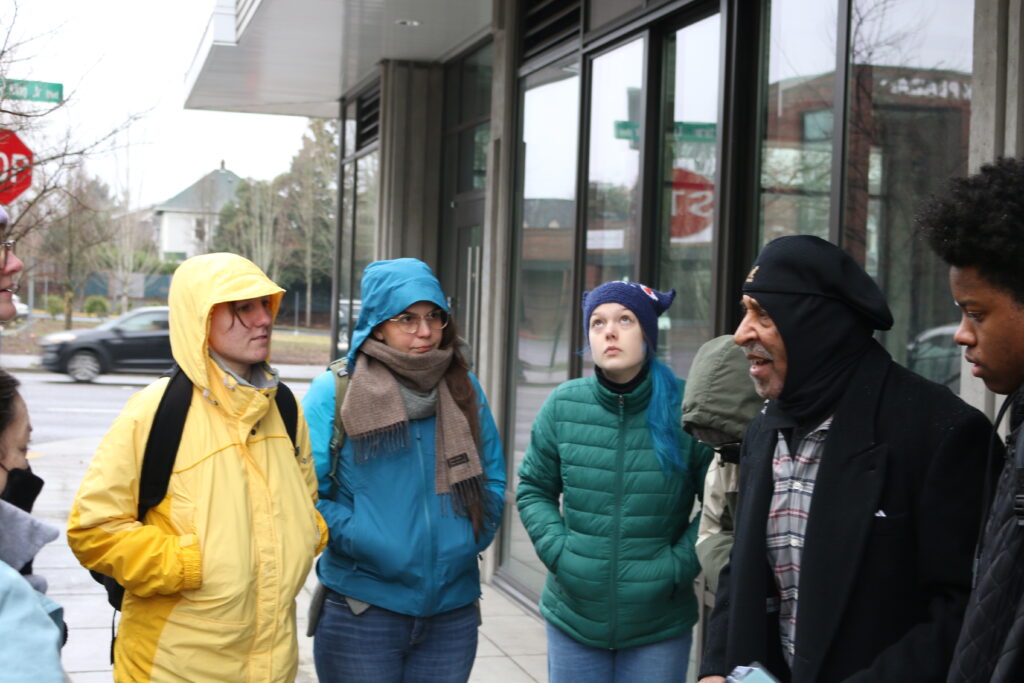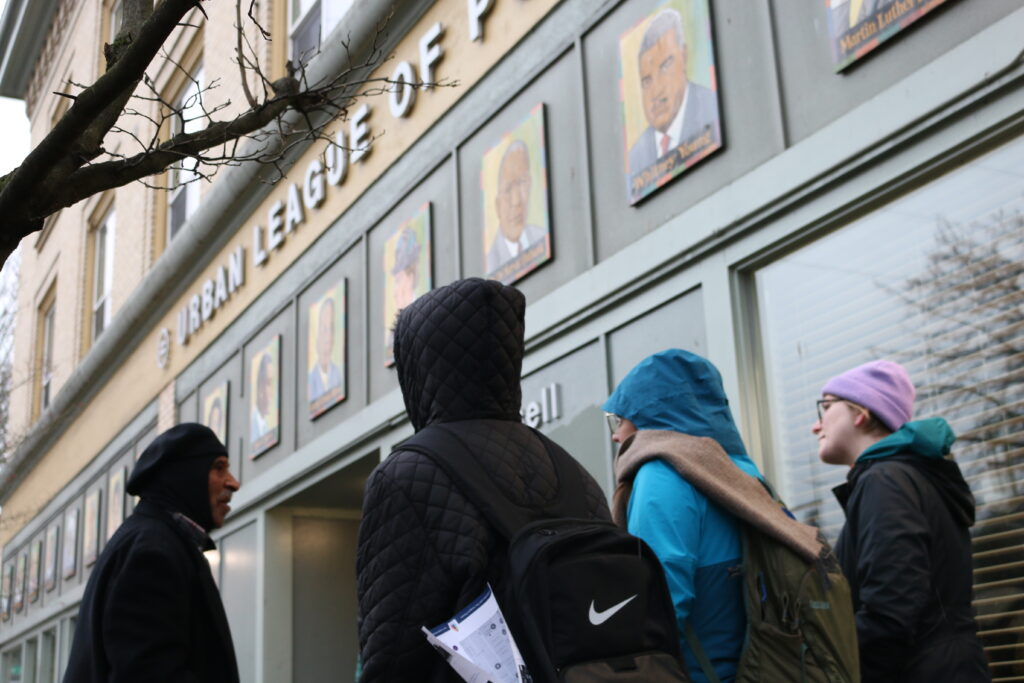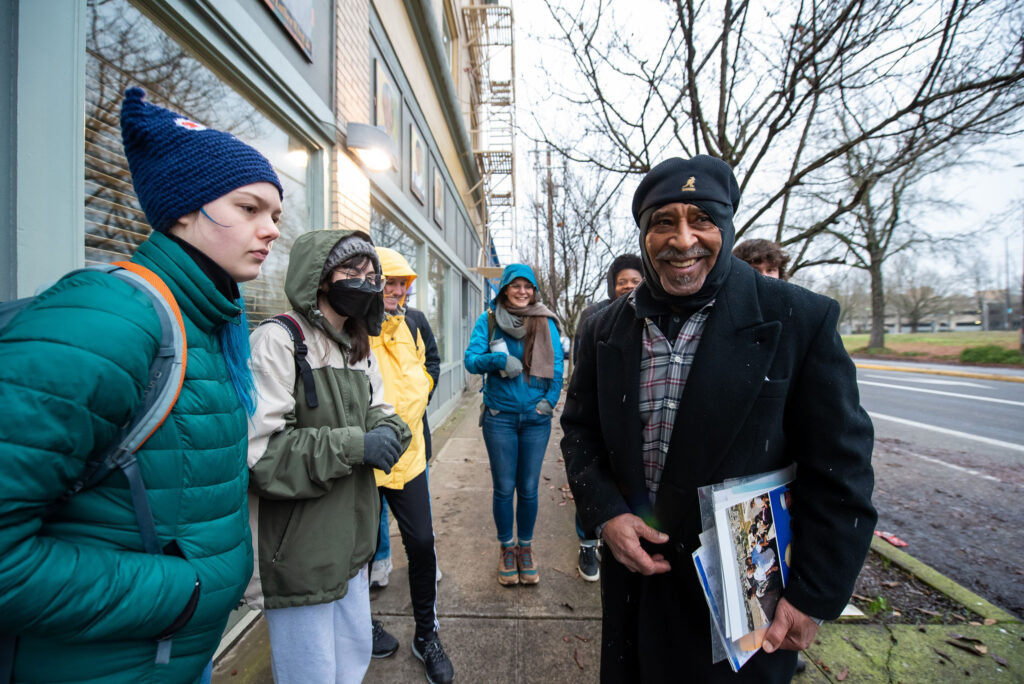Portland Black Panther Party Founder Kent Ford discusses past, present, future for Black Americans



An elderly Black woman called to us, “If you listen to this man you’ll get wisdom,” as we stood outside the Matt Dawson Community Center, waiting for Kent Ford to start the tour.
The tour was centered around the historic Albina neighborhood, where the Portland Chapter of the Black Panther Party (BPP) was headquartered. The Center for Social Change and Community Involvement organized the tour for Martin Luther King Jr. Week.
Ford founded Portland’s Chapter in 1969 with Tommy Mills, a decorated veteran of the Vietnam War.
Without the Vietnam War, Ford may not have joined The Panthers.
“I came into The Party, not via the civil rights movement, but the peace movement,” Ford said. “The Party was the only Black organization that was against the Vietnam War. The groups like the NAACP, the Urban League and the mainstream groups, civil rights groups, they took no stand on that and it was wrong – the war in Vietnam, the great Empire out there fighting people from getting independence and people of color.”
Their first office was at the corner of Cook Street and Martin Luther King Jr. Boulevard. The building itself is now gone, replaced by a housing complex. The boulevard was renamed to honor the late activist in 1989, a date Ford overestimated in one of the tour’s refrains:
“In the ’70s the city got in the Martin Luther King business,” Ford repeated.
Two blocks up from the office, in a similarly replaced McDonald’s parking lot, Ford was beaten and arrested by the Portland police officers.
“They arrested me, you guys, pulled me out of the car and beat me,” Ford said. “Pulled me out of the back of a police car.”
The Portland Police Department (PPD) did not have any evidence against Ford, and he knew it. So, he was not particularly worried about long term incarceration. His release soon proved him right. That did not stop PPD from retaliating, though.
“I got acquitted on a Friday,” Ford said. “They hit us on a Tuesday, go figure.”
Using state-sanctioned violence and law enforcement to suppress the BPP was a part of a nationwide pattern. Fred Hampton, head of the Chicago chapter, was fatally shot by police in his apartment in a coordinated assassination by the Cook County State Attorney’s Office tactical unit, the FBI, and Chicago PD.
The free health clinic, opened by the Portland chapter in 1969 was named after Hampton. The Fred Hampton People’s Free Health Clinic offered medical attention to anyone who needed it for free, five nights a week from 7 to 9 p.m. The medical clinic closed in 1979, and the building, formerly located in the historic Albina neighborhood, no longer stands.
BPP had other health initiatives, one of which was focused around testing for sickle cell anemia. A survivor of Fred Hampton’s murder founded this program. He was shot in the stomach.
“One of the guys who was in the apartment the night Fred Hampton got dusted, his name was Doc Satchel, and Doc Satchel helped set up the ER medical clinic in Chicago,” Ford said. “So he hooked up with Dr. Burt Small and Dr. Burt Small was out of Wayne State University Medical School in Detroit. And they set up the sickle cell anemia thing nationwide for The Party.”
In Portland, the sickle cell testing was based out of Highland United Church of Christ. The initiative, however, was nationwide and garnered a lot of media attention.
“The Black Panthers started testing for sickle cell anemia, two weeks later Portland Public Schools were doing it,” Ford said. “Nixon went on the air, gave six million (dollars) to sickle cell anemia.”
Ford discussed big players in the Civil Rights Movement besides Fred Hampton.
“If you want to know how we got to the troubles in prisons, how we got to where we are today in America, read Malcolm (X) and read (James) Baldwin,” Ford said.
Notably missing from that list is the man whose holiday we were celebrating: Dr. Martin Luther King Jr.
“Dr. King has so much faith and so much Jesus in him, you don’t want to do nothing to hurt the man,” Ford said. “But, Malcolm said you speak the language they’re speaking to you. It don’t take fifty years to prove you’re human.”
Ford’s hesitancy toward placing MLK on the same level as the other two may harken back to his reason for joining The Panthers to begin with.
“The speech Dr. King made on December the fourth 1967. It’s a long speech, and it took him a long time to make his points and stuff like that,” Ford said. “But he had 15 hundred people at the Riverside Church in New York, and he talked about the war in Vietnam. Mind you now, he had gotten the 1964 Nobel Peace Prize for his work with the Montgomery bus boycotts.”
A pediatrician and a minister, both white, approached the Reverend Doctor and asked how he could have won the Nobel Peace Prize and not stand out against the Vietnam War. On March 4, 1967 the Nobel Laureate gave a speech called “Beyond Vietnam—A time to Break Silence.” A year later to the day he was assassinated.
“You know you’re doing something right if they come after you.” Ford said.
Despite his role in it, Ford said very limited progress came from the Civil Rights Movement.
“Civil rights was a miserable failure, it didn’t convince the police departments in different municipalities, counties, cities, states across America that they shouldn’t be killing people or sending them off to prison,” Ford said.
Despite this pessimism, Ford has seen progress.
“We’ve accomplished more since George Floyd than civil rights accomplished in 50 years,” Ford said.
In terms of continued progress, Ford has two areas of focus, the first being finally ending police brutality and discriminatory penalization and enforcement. Ford emphasizes patience and determination.
“We have to just take it like the guys in recovery, we’ve got to take it just a day at a time,” Ford said. “Just like the people of Portland Oregon when they set the standard for the world, not just America but for the world, by sustaining the protests (of George Floyd’s murder) for over 100 days.”
Second, the BPP member pushes for a renewed focus on international humanitarian action.
“More people live in the world besides us,” Ford said. “We’ve got to stop the schoolyard bullying.”
In terms of The Party’s legacy, Ford is pleased.
“We had a ten point platform and program, land, bread, housing, everything that was valid then in 1966 is valid today,” Ford said. “Number 7 was the immediate end of police brutality and the murder of Black people and the prison pipeline and all of that. The best of the legacy of Black child support is yet to come, and we took a stand with the patrols in the neighborhoods, watching the police do they work when they do those routine stops.”
Of those ten points, number five stands out to me.
“We want education for our people that exposes the true nature of this decadent American society,” The Black Panther Party Ten Point Platform says. “We want education that teaches us our true history and our role in the present day society.”
Subscribe to the Mossy Log Newsletter
Stay up to date with the goings-on at Lewis & Clark! Get the top stories or your favorite section delivered to your inbox whenever we release a new issue.

Leave a Reply